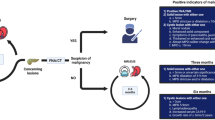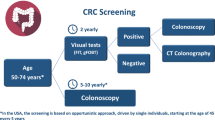Abstract
Background and Objectives
Early age of onset is a marker of a possible hereditary component in colorectal cancer (CRC). We evaluated whether early age of onset is a good marker to identify Lynch syndrome, especially retrospectively, and if there is any other feature that could improve this identification.
Methods
We selected patients with CRC aged 45 years or younger from the pathological reports of three different institutions and different periods of time. Clinical information, family history, and tumor samples were obtained. Cases were classified according to mismatch repair (MMR) proficiency.
Results
Of 133 tumors, 22 showed microsatellite instability (MSI). In 15 MSI cases, a germline mutation in 1 of the MMR genes was identified, 7 of which were not identified before. The positive predictive value (PPV) of right colon CRC for a positive genetic MMR test is 30.6%, whereas “signet ring” cells and fulfillment Amsterdam II criteria have PPVs of 42.9% and 47.8%, respectively. Combining right-sided CRC with mucin production, with fulfilling Amsterdam II criteria, or with “signet ring” cells, PPVs are 54.5, 64.3, and 100%. The probability of the absence of a mutation when CRC is located in the left colon is 94.7%, whereas absence of aggregation for Lynch-related neoplasm has a 100% probability.
Conclusions
Early age of onset is an effective method to identify retrospectively Lynch syndrome. Taking into account the location and histology features of the tumor, and the familial history of the cases, we notably increase the a priori probability of detecting a germline MMR mutation.
Similar content being viewed by others
References
Boyle P, Ferlay J. Cancer incidence and mortality in Europe, 2004. Ann Oncol. 2005;16:481–8.
Siegel RL, Jemal A, Ward EM. Increase in incidence of colorectal cancer among young men and women in the United States. Cancer Epidemiol Biomarkers Prev. 2009;18(6):1695–8.
Aaltonen LA, Salovaara R, Kristo P, et al. Incidence of hereditary nonpolyposis colorectal cancer and the feasibility of molecular screening for the disease. N Engl J Med. 1998;338:1481–7.
Samowitz WS, Curtin K, Lin HH, et al. The colon cancer burden of genetically defined hereditary nonpolyposis colon cancer. Gastroenterology. 2001;121:830–8.
Watson P, Lynch HT. The tumor spectrum in HNPCC. Anticancer Res. 1994;14:1635–9.
Vasen HF, Watson P, Mecklin JP, et al. New clinical criteria for hereditary nonpolyposis colorectal cancer (HNPCC, Lynch syndrome) proposed by the International Collaborative group on HNPCC. Gastroenterology. 1999;116:1453–6.
Vasen HF, Mecklin JP, Khan PM, Lynch HT. The International Collaborative Group on Hereditary Non-Polyposis Colorectal Cancer (ICG-HNPCC). Dis Colon Rectum. 1991;34:424–5.
Rodriguez-Bigas MA, Boland CR, Hamilton SR, et al. A National Cancer Institute Workshop on hereditary nonpolyposis colorectal cancer syndrome: meeting highlights and Bethesda guidelines. J Natl Cancer Inst. 1997;89:1758–62.
Umar A, Boland CR, Terdiman JP, et al. Revised Bethesda guidelines for hereditary non polyposis colorectal cancer (Lynch syndrome) and microsatellite instability. J Natl Cancer Inst. 2004;96:261–8.
Liang JT, Huang KC, Cheng AL, et al. Clinicopathological and molecular biological features of colorectal cancer in patients less than 40 years of age. Br J Surg. 2003;90:205–14.
Losi L, Di Gregorio C, Pedroni M, et al. Molecular genetic alterations and clinical features in early-onset colorectal carcinomas and their role for the recognition of hereditary cancer syndromes. Am J Gastroenterol. 2005;100:2280–7.
Yiu R, Qiu H, Lee SH, et al. Mechanisms of microsatellite instability in colorectal cancer patients in different age groups. Dis Colon Rectum. 2005;48:2061–9.
Perea J, Alvaro E, Rodriguez Y, et al. Approach to early-onset colorectal cancer: Clinicopathological, familial, molecular and immunohistochemical characteristics. World J Gastroenterol. 2010;16:3697–703.
Aaltonen LA, Peltomaki P, Mecklin JP, et al. Replication errors in benign and malignant tumors from hereditary nonpolyposis colorectal cancer patients. Cancer Res. 1994;54:1645–8.
Farrington SM, Lin-Goerke J, Ling J, et al. Systematic analysis of hMSH2 and hMLH1 in young colon cancer patients and controls. Am J Hum Genet. 1998;63:749–59.
Chiang JM, Chen MC, Changchien CR, et al. Favorable influence of age on tumor characteristics of sporadic colorectal adenocarcinoma. Dis Colon Rectum. 2003;46:904–10.
Gryfe R, Kim H, Hsieh ET, et al. Tumor microsatellite instability and clinical outcome in young patients with colorectal cancer. N Engl J Med. 2000;342:69–77.
Chung YFA, Eu KW, Machin D, et al. Young age is not a poor prognostic marker in colorectal cancer. Br J Surg. 1998;85:1255–9.
Foo W, Young JM, Solomon MJ, Wright CM. Family history? The forgotten question in high-risk colorectal cancer patients. Colorectal Dis. 2009;11:450–5.
Overbeek LIH, Hoogerbrugge N, van Krieken J, et al. Most patients with colorectal tumors at young age do not visit a Cancer Genetic Clinic. Dis Colon Rectum. 2008;51:1249–54.
Boland CR, Thibodeau SN, Hamilton SR, et al. A National Cancer Institute Workshop on microsatellite instability for cancer detection and familial predisposition: development of international criteria for the determination of microsatellite instability in colorectal cancer. Cancer Res. 1998;58:5248–57.
Rouleau E, Lefol C, Bourdon V, et al. Quantitative PCR High-Resolution Melting (qPCR-HRM) curve analysis, a new approach to simultaneously screen point mutations and large rearrangements: application to MLH1 germline mutations in Lynch syndrome. Hum Mutat. 2009;30:867–75.
Kloor M, Voigt AY, Schackert HK, et al. Analysis of EPCAM protein expression in diagnostics of Lynch syndrome. J Clin Oncol. 2011;29:223–7.
Southey MC, Jenkins MA, Mead L, et al. Use of molecular tumor characteristics to prioritize mismatch repair gene testing in early-onset colorectal cancer. J Clin Oncol. 2005;23:6524–32.
Niessen RC, Berends MJW, Wu Y, et al. Identification of mismatch repair gene mutations in young patients with colorectal cancer and in patients with multiple tumours with hereditary non-polyposis colorectal cancer. Gut. 2006;55:1781–8.
Pucciarelli S, Agostini M, Viel A, et al. Early-age-at-onset colorectal cancer and microsatellite instability as markers of hereditary nonpolyposis colorectal cancer. Dis Colon Rectum 2003;46:305–12.
Perea J, Ortiz M, Hidalgo M, et al. Importance of family history in colorectal cancer clinical practice. Colorectal Dis. 2010;12:606.
Acknowledgment
This work was funded by the Mutua Madrileña Foundation (Project P133-08). The authors thank the Pathology Departments of Gregorio Marañón University Hospital, Segovia Hospital, and 12 de Octubre University Hospital for providing us with the paraffin-embedded tissues, and Ron Hartong for his help with the English redaction of the article.
Disclosure
The authors declare that they have no competing interests.
Author information
Authors and Affiliations
Corresponding author
Rights and permissions
About this article
Cite this article
Perea, J., Rodríguez, Y., Rueda, D. et al. Early-Onset Colorectal Cancer is an Easy and Effective Tool to Identify Retrospectively Lynch Syndrome. Ann Surg Oncol 18, 3285–3291 (2011). https://doi.org/10.1245/s10434-011-1782-4
Received:
Published:
Issue Date:
DOI: https://doi.org/10.1245/s10434-011-1782-4




